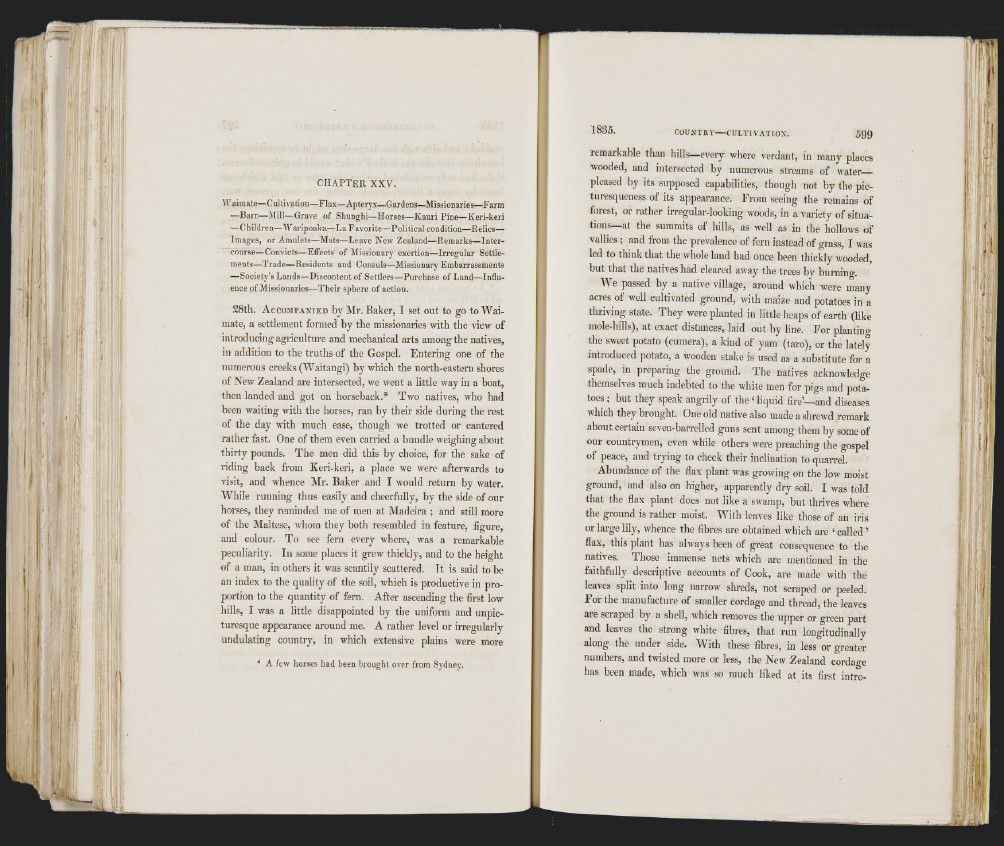
" 4
ill' 4'
CHAPTER XXV.
Waimate—Cultivation—Flax—Apteryx—Gardens—Missionaries—Farm
—Barn—Mill—Grave of Shunghi—Horses—Kauri Pine—Keri-keri
—Children—Waripoaka—La Favorite—Political condition—Relics—
Images, or Amulets—Mats—Leave New Zealand—Remarks—Intercourse—
Convicts—Effects of Missionary exertion—Irregular Settlements—
Trade—Residents and Consuls—Missionary Embarrassments
—Society’s Lands—Discontent of Settlers—Purchase of Land—Infiuence
of Missionaries—Their sphere of action.
28tli. A c c o m p a n i e d by Mr. Baker, I set out to go toWai-
luate, a settlemeut formed by the missiouaries with the view of
introduciug agriculture and mechanical arts among the natives,
in addition to the truths of the Gospel. Entering one of the
numerous creeks (Waitangi) by which the north-eastern shores
of New Zealand are intersected, we went a little way in a boat,
then landed and got on horseback.* Two natives, who had
been waiting with the horses, ran by their side during the rest
of the day with much ease, though we trotted or cantered
rather fast. One of them even carried a bundle weighing about
thirty pounds. The men did this by choice, for the sake of
riding back from Keri-keri, a place we were afterwards to
visit, and whence Mr. Baker and I would return by water.
While running thus easily and cheerfully, by the side of our
horses, they reminded me of men at Madeira ; and still more
of the Maltese, whom they both resembled in feature, figure,
and colour. To see fern every where, was a remarkable
peculiarity. In some places it grew thickly, and to the height
of a man, in others it was scantily scattered. It is said to be
an index to the quality of the soil, which is productive in proportion
to the quantity of fern. After ascending the first low
hills, I was a little disappointed by the uniform and unpic-
turesque appearance around me. A rather level or irregularly
undulating country, in which extensive plains were more
** A few horses had been brought over from Sydney.
remarkable than hills—every where verdant, in many places
wooded, and intersected by numerous streams of water__
pleased by its supposed capabilities, though not hy the picturesqueness
of its appearance. From seeing the remains of
forest, or rather irregular-looking woods, in a variety of situations—
at the summits of hills, as well as in the hollows of
vallies ; and from the prevalence of fern instead of grass, I was
led to think that the whole land had once been thickly wooded,
but that the natives had cleared away the trees by burning.
We passed by a native village, around which were many
acres of well cultivated ground, with maize and potatoes in a
thriving state. They were planted in little heaps of earth (like
mole-hills), at exact distances, laid out by line. For planting
the sweet potato (cumera), a kind of yam (taro), or the lately
introduced potato, a wooden stake is used as a substitute for a
spade, in preparing the ground. The natives acknowledge
themselves much indebted to the white men for pigs and potatoes
; but they speak angrily of the ‘ liquid fire’—and diseases
which they brought. One old native also made a shrewd remark
about certain seven-barrelled guns sent among them by some of
our countrymen, even while others were preaching the gospel
of peace, and trying to check their inclination to quarrel.
Abundance of the flax plant was growing on the low moist
ground, and also on higher, apparently dry soil. I was told
that the flax plant does not like a swamp, but thrives where
the ground is rather moist. With leaves like those of an iris
or large lily, whence the fibres are obtained which are ‘ called ’
flax, this plant has always been of great consequence to the
natives. Those immense nets which are mentioned in the
faithfully descriptive accounts of Cook, are made with the
leaves split into long narrow shreds, not scraped or peeled.
For the manufacture of smaller cordage and thread, the leaves
are scraped by a shell, which removes the upper or green part
and leaves the strong white fibres, that run longitudinally
along the under side. With these fibres, in less or greater
numbers, and twisted more or less, the New Zealand cordage
has been made, which was so much liked at its first intro-
' f
p' I
:
i i
Ml
‘•f
I
IL
Ú It